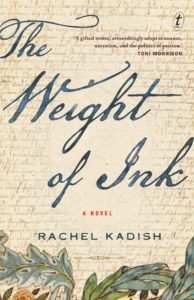Not a single word seems out of place or extraneous in Ayelet Tsabari’s superb new memoir, The Art of Leaving.
Tsabari is an Israeli who currently lives in Canada. Her previous book of short stories, The Best Place on Earth (2015), won a bevy of literary awards, including the $100,000 Sami Rohr Prize for Jewish Literature.
Though she may never have read him, Tsabari has obviously followed thriller writer Elmore Leonard’s practice of “leaving out the parts that people don’t want to read.” I found her prose deep in meaning, rich in imagery and continuously engaging down to the last participle.
In The Art of Leaving, Tsabari traces her peripatetic path from Israel to a host of places around the world, including Vancouver and Toronto, and her inevitable return to Israel, where she reconnects with the Yemeni-Jewish heritage she had long rejected. Like Dorothy in The Wizard of Oz, she’s on a quest for meaning and identity and a search for her spiritual home.
Arriving from Yemen in 1935, her grandparents lived for the first several years in a homemade mud hut in the Israeli town of Sha’ariya, a Yemeni-Jewish village east of Petah Tikva. Born in the same village, Tsabari grew up to feel the sting of being a Mizrahi Jew in a society dominated by Ashkenazic Jews who regarded Mizrahim mainly as menial labourers and house cleaners.
Besides her native Hebrew, Tsabari spoke Arabic and regarded herself as an “Arab Jew,” feeling a kinship with Iraqi, Lebanese and other Arab transplants. Her dark skin led one of her Arab friends to comment that she “looked more Arabic than I do.”
A major blow for her came with the death of her father when she was nine, a loss that permeates all of her major decisions as a young adult. When she calls home from Manhattan, her mother notices she doesn’t sound happy and urges her to come back to Israel. “I say nothing. I don’t know how to tell her that some days, it feels like I might never be back. How to explain that losing Abba at an age when my identity was still entwined with his, when he was my homeland, made me feel exiled, displaced. How sometimes his absence pulsates in my body like a phantom limb or an excised organ,” she writes.
READ: ‘FABLED CITY’ IS A WELCOME ADDITION TO CANADIAN JEWISH HISTORY
Like most Israeli youth, Tsabari joined the army at 18, but her bad attitude leads to her being continuously demoted and disciplined until she ends up in “the base’s recycling bin, a transit unit consisting of misfits and rejects, troubled and authority-challenged soldiers. Soldiers who ended up there were assigned to the dirtiest and most mindless jobs, mostly cleaning and standing at the base’s gates. I noticed most of us were Mizrahi.”
With grace and honesty, Tsabari describes a string of relationships she had with both men and women, most of which end when she decides that it’s time to leave. But with a man named Sean, it was different, partly because he encouraged her to develop her identity as a writer. “Our relationship opened me up to the liberties that lie within commitment, within the security of a nurturing, happy relationship, and released me from my encumbering need to be free at all costs. It was a discovery that echoed my journey into writing in English, my astounding realization that creative freedom could be unearthed within the constraints of a second language, a vastness within the limitations that gave space for invention and fantasy,” she writes.
Eventually, Tsabari returned home and immersed herself in her family’s Yemeni culture, stories and recipes that she had neglected for too long. Like many female memoirists, she discovers that one of the best windows into her family’s heritage is through the stomach and the wonderful traditional dishes handed down from her grandmother. By doing some genealogy and talking to relatives, she also resolves some mysteries in her family tree, gaining new insight into her great-grandmother who abandoned her children.
Satisfyingly, the book comes full circle and Tsabari comes back to her roots, so grateful to have returned safely from her voyage of discovery that she offers two wonderful creative gifts to the world: this memoir and a beautiful baby daughter. Let’s hope there’s more to come from this incredibly talented writer and mother who seems at the height of her creative powers.
* * *

If you liked A.S. Byatt’s novel Possession, you’ll probably enjoy Rachel Kadish’s The Weight of Ink, which places a remarkably similar plot into a Jewish context. A rare trove of centuries-old Jewish papers is discovered in the bowels of a house that’s under renovation in London. Scholar Helen Watt calls in a young American graduate student, Aaron Levy, to examine the papers and help decipher their meaning and importance.
Before long, they discover that many of the mysterious documents are the work of Ester Velasquez, a 17th-century Jewish female author who didn’t let her sex stand in the way of her scholarship. Velasquez, a Dutch Jew transplanted to England, corresponds with Baruch Spinoza and other great Jewish minds across the Diaspora, providing a rich portrait of contemporaneous Jewish life in Amsterdam and London.
The chapters shift between the present, involving the relationship between Watt and Levy as they unravel the mystery of the Hebrew papers, and the 17th-century world of Velasquez that she so richly describes. The Weight of Ink is expertly rendered, but perhaps at too great a length (560 pages). For me, the book itself became quite weighty and I had to put it down before I reached the end.






